Funded under the National Recovery and Resilience Plan (NRRP), Mission 4 Component 2 Investment 1.3, Theme 10.
Foodmeter: the new free tool for measuring the sustainability of agri-food supply chains
To monitor and improve the environmental, social, and economic impact of agri-food businesses and the daily choices of citizens. Foodmeter.it has been launched, a free web application for an initial self-assessment of the sustainability of agri-food supply chains.

Giulio Burroni
Communication manager
In recent years, sustainability has become a priority for businesses and institutions, driven by an increasingly stringent regulatory environment. The introduction of the European Union’s Corporate Sustainability Reporting Directive (CSRD), for example, requires large companies to measure and report their environmental, social, and economic impact. Although not directly mandated, many small and medium-sized enterprises (SMEs) are indirectly affected by these regulations, especially when they operate as suppliers in monitored supply chains.
Furthermore, the demand for products that meet environmental and social criteria is steadily increasing, driven by greater awareness of the impact of food choices. This trend not only concerns environmental aspects but also extends to issues such as supply chain transparency, animal welfare, and labor conditions throughout the production chain.
Agricultural businesses, for their part, face a series of complex and interconnected challenges. On the one hand, they must comply with increasingly stringent regulations and quality standards; on the other, they are called upon to innovate their processes to reduce their ecological footprint, improve efficiency, and ensure sustainable competitiveness.
This scenario represents not only a test but also an opportunity to redefine production models and align more closely with the expectations of the global market. It is a true transition in mindset and practice that, however, cannot occur without scientific research providing solid definitions and the implementation of effective metrics and measurements for sustainability.
In this context, the adoption of multicriteria decision analysis (MCDA) methods is considered one of the most suitable and promising approaches to fully capture the complex and large-scale effects of agricultural practices and agri-food supply chains.
Once the most effective methods and criteria are identified, it is important to bring research closer to the local level, and for this purpose, technology can become the bridge between two worlds that are often too distant.
It is no coincidence that accessible and rigorous tools for sustainability assessment are increasingly in demand, and it is within this framework that Foodmeter fits, the digital application designed to help agri-food businesses and consumers understand and improve their impact.
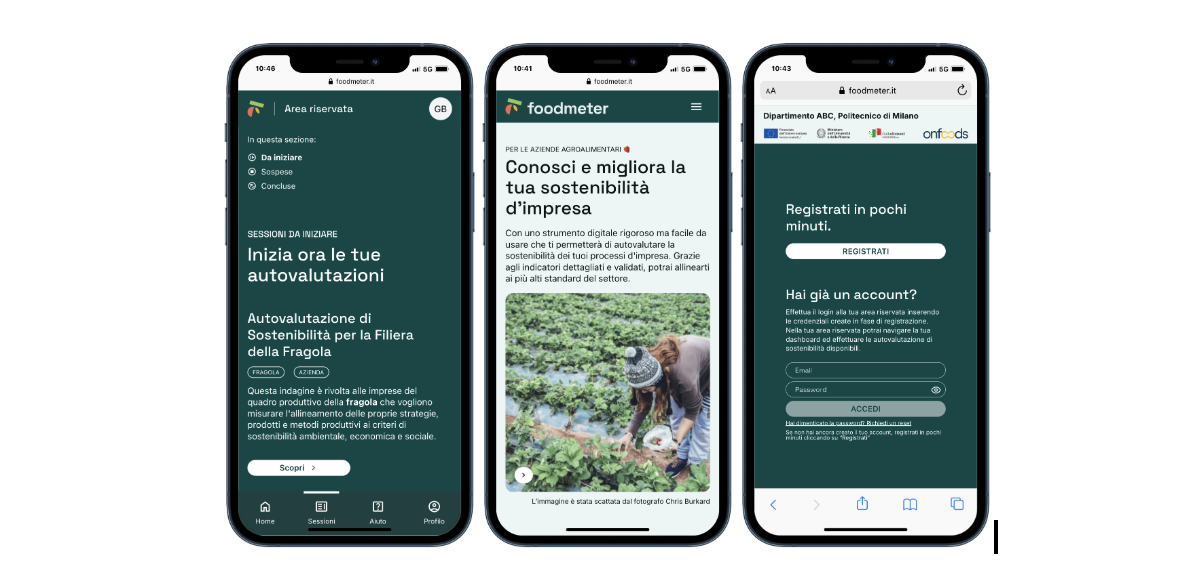
A platform born from the research of the Politecnico di Milano within the OnFoods project.
Foodmeter is one of the tangible outcomes of the PER-REP project, coordinated by the ABC Department of the Politecnico di Milano and part of Spoke 1 (Global Sustainability) of OnFoods, a research partnership funded by the PNRR.
The application, still in beta phase, is designed to offer a free, practical self-assessment tool based on scientifically validated indicators. The goal is twofold: on the one hand, to allow SMEs to measure the sustainability of their processes; on the other, with the upcoming release of a new version, to raise consumer awareness about the impact of their food choices.
The overall vision that guided the project," comments the principal investigator of PER-REP, Prof. Paola Caputo, "is to promote awareness and the spread of tools to foster greater sustainability, concretely facilitating the improvement of the environmental and social impact of one's activities.
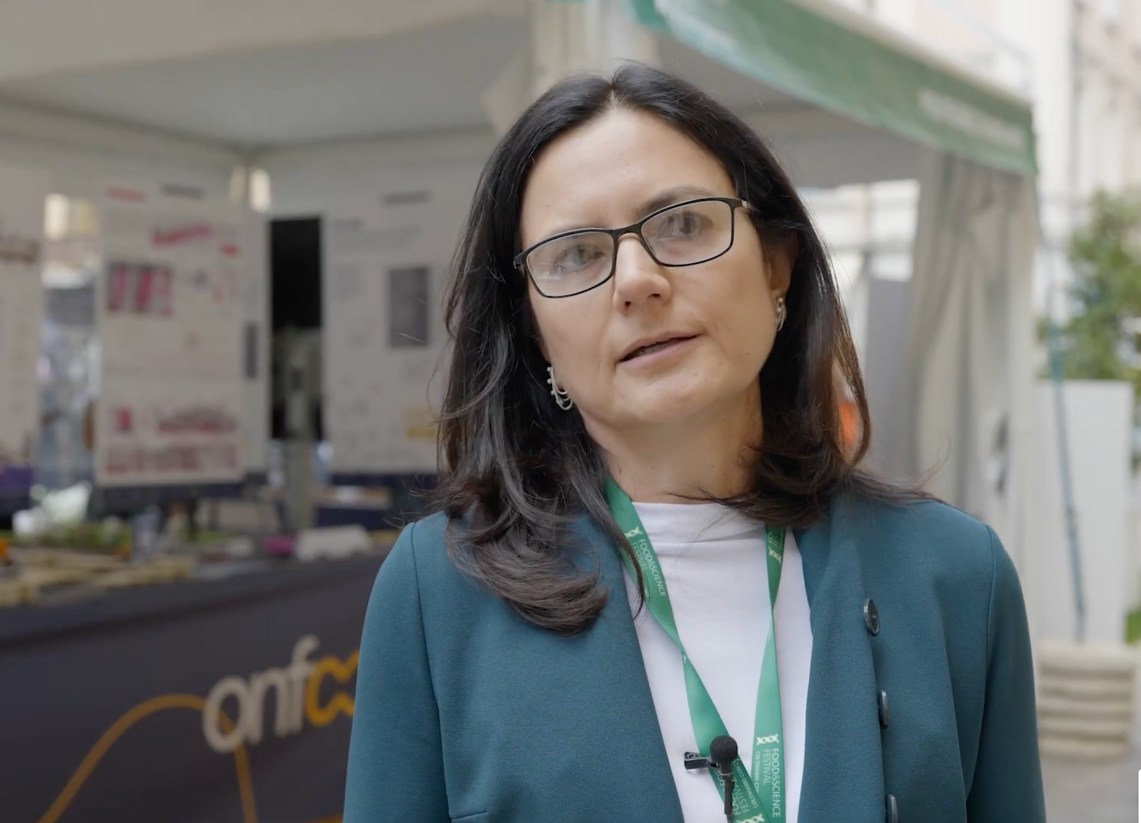
How does Foodmeter work?
The application, easily accessible via web browser on all common desktop and mobile devices, is divided into two main areas: 1) a public section that introduces the service and the context of sustainability; 2) a reserved area where registered users can complete self-assessments, access the results of completed assessments, and download their sustainability badges.
The indicators used by the research group to define the self-assessment cover 11 macro-areas, including environmental parameters (such as energy consumption, water quality, and waste management), social parameters (such as labor practices), and economic ones.
Once the self-assessment is completed, the user receives a detailed report with specific recommendations to improve critical areas.
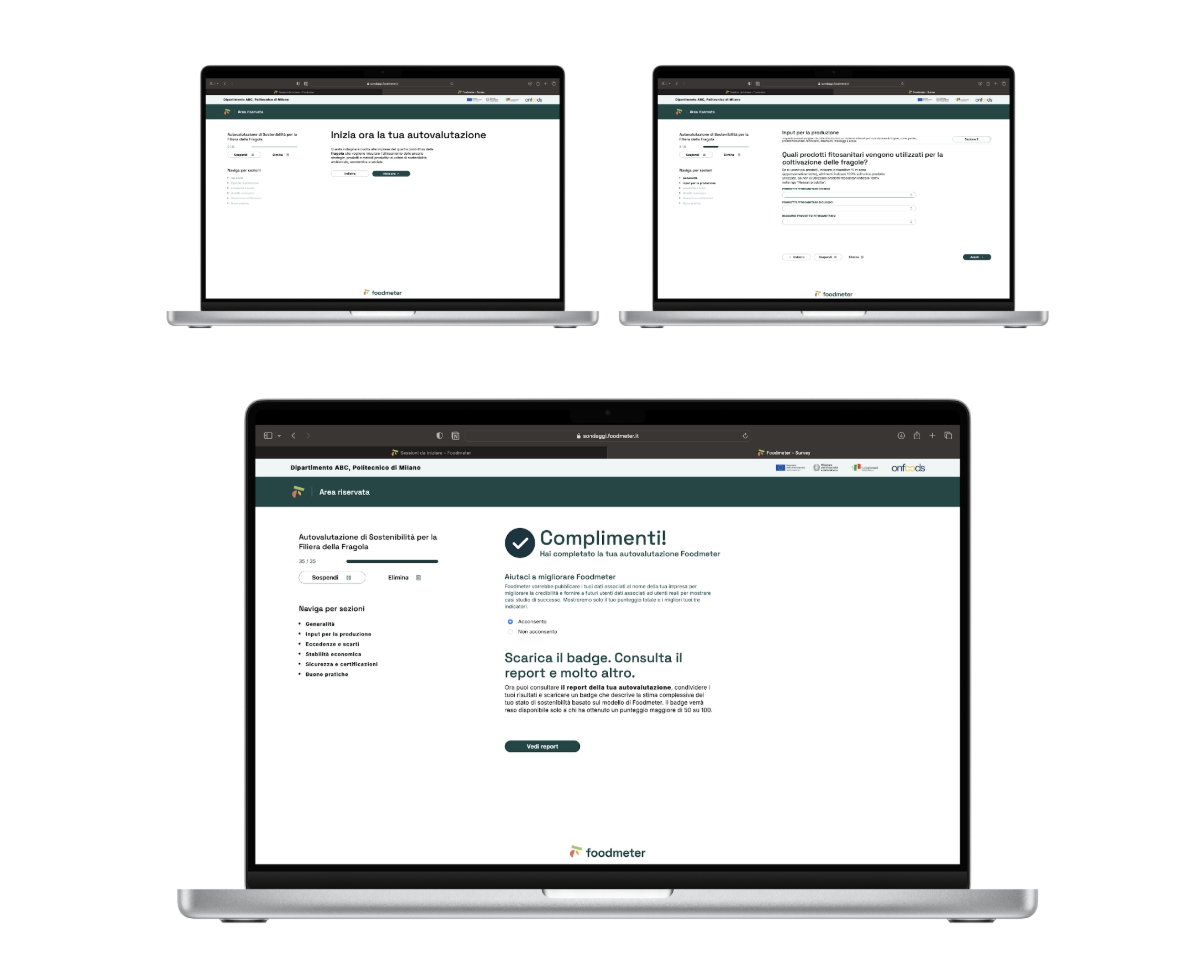
Although the project is currently aimed at small agricultural businesses, particularly in the strawberry supply chain, the ambition is to extend the service to a broader audience. Foodmeter thus aims to be a support tool for businesses that want to meet the sustainability demands imposed by the market and regulators. At the same time, the platform seeks to engage consumers by providing them with concrete data to make more informed food choices.
"The intention to develop this application," continues Paola Caputo, "stems from a fundamental awareness: scientific research represents an invaluable social and innovative resource that, however, risks suffering from a gap with the practical implementation of strategies. For this reason, it seemed important to us to integrate the results of our research into a tool that can be used by the main actors of the agri-food system: businesses and consumers".
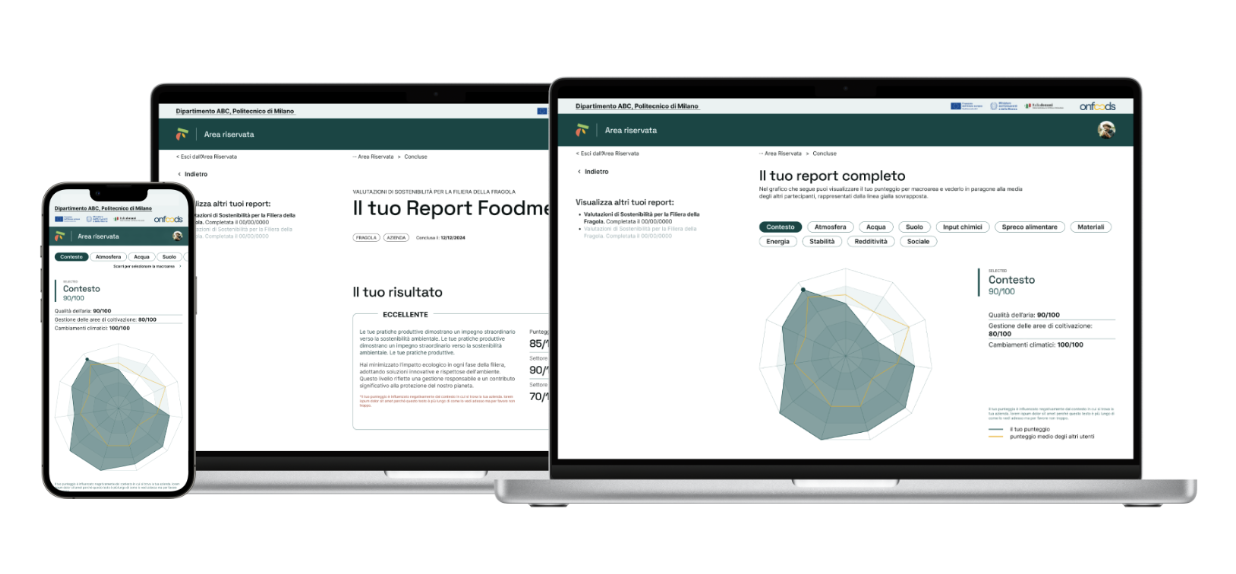
In a context where sustainability is no longer an option but a necessity, Foodmeter is an example of how academic research can be translated into useful tools for the productive world. Small and medium-sized enterprises (PMIs), often lacking the resources to independently manage sustainability monitoring, find in platforms like this a concrete support to navigate the complexities of new scenarios.
The next step for Foodmeter will be its official launch and the expansion of its features to support an increasing number of businesses and consumers on the path toward greater sustainability.
The working group of the PER-REP research project (Decision-making tool for sustainability performance assessment, communication, and reporting)
Foodmeter was developed as part of the activities of the PER-REP research project, which falls under Spoke 1 of OnFoods. Below are the people who worked on the project:
Paola Caputo is an Associate Professor at the Politecnico di Milano (DABC) in the field of Environmental Technical Physics. She holds a degree in Environmental Engineering and a PhD in Energy, and her research focuses on energy systems, renewable district heating networks, and energy-environmental analysis of agri-food supply chains. She collaborates with universities and international working groups and has numerous scientific publications to her name.
Giulio Ferla is a Researcher at the Politecnico di Milano in the field of Environmental Technical Physics. He graduated in Civil Engineering in 2018 and obtained his PhD in 2021 from the DABC of Politecnico di Milano, focusing on the analysis and optimization of biomass district heating systems. His work covers buildings, energy, and renewable sources, with expertise in district heating systems, energy communities, energy modeling, and energy-environmental assessments of agri-food supply chains.
Silvia Falasco is a Research Fellow at the Politecnico di Milano, where she focuses on sustainability assessments of agri-food supply chains. She graduated in Food Innovation and Management in 2021 from the University of Gastronomic Sciences and is currently completing her PhD at the DABC of Politecnico di Milano, with a focus on the environmental assessment of food production, distribution, and consumption.
Benedetta Mura, who graduated with honors in Building Engineering-Architecture from the Politecnico di Milano, after conducting a research project on the energy-environmental assessments of agri-food supply chains, is currently a PhD student at the same institution, focusing on innovative thermal networks powered by renewable sources and waste heat.
The Foodmeter application was developed by Dinamo, a development and communication company, which handled the branding, content, interface design, backend development, and integrations with the calculation methods defined by the PER-REP team.
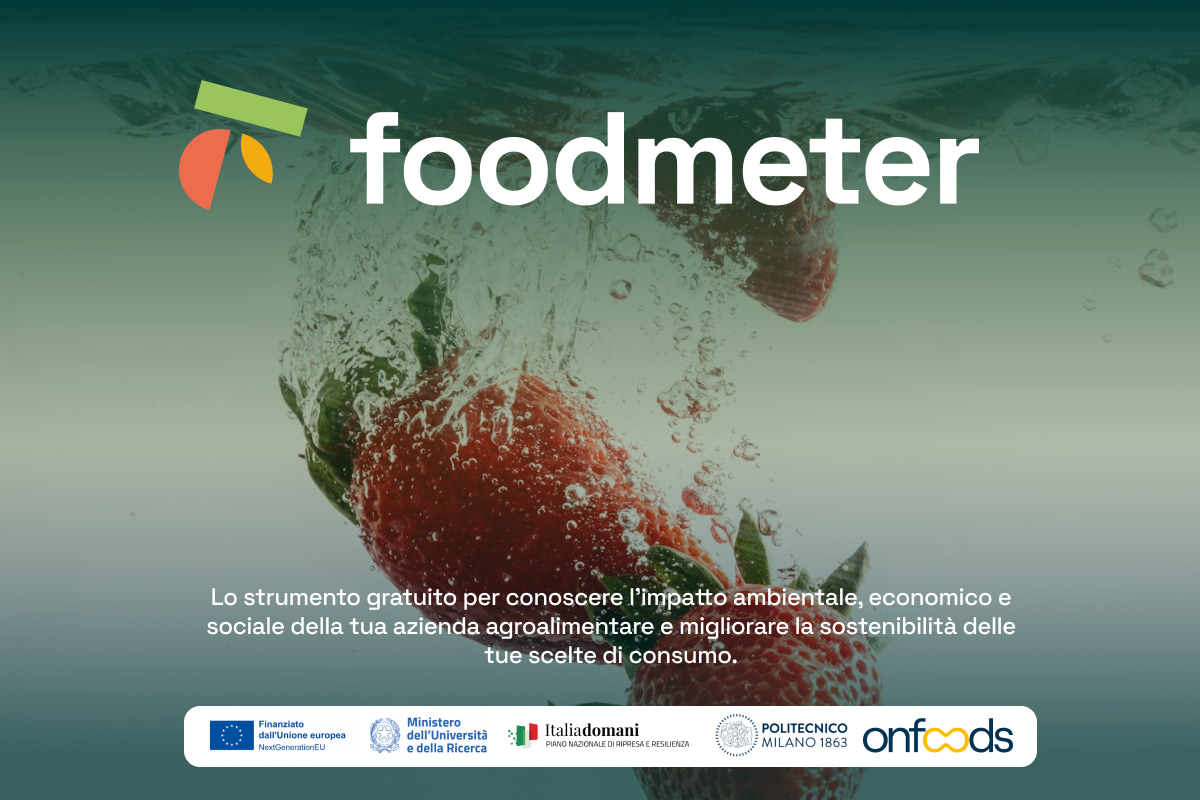

Giulio Burroni
Communication manager
Specialist in Communication and Project Management with over 8 years of experience in agency work. Currently involved in communication, branding, and design projects within the public administration, research institutions, and university sectors
This blog post is related to
Global Sustainability
Fair food market for healthy citizens
Decision support system for the life cycle optimisation of food manufacturing value chains
Principal investigators
Referred to
Spoke 02

